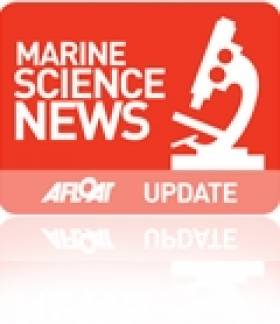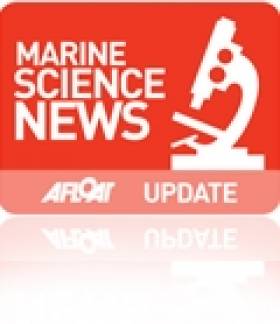Displaying items by tag: EUROFLEETS2
Calls Now Open For Marine Reaearch Funding Under EUROFLEETS2
#MarineScience - Applications are now being invited under EUROFLEETS2, an EU-funded project providing scientists with 200 fully funded days of ship-time and 104 fully funded days of marine equipment to carry out ship-based research activities within any field of marine sciences.
EUROFLEETS2 - which had its kick-off meeting gathering more than 60 marine scientists and fleet operators in April this year - aims to bring together the European research fleets to enhance their co-ordination and promote the cost effective use of their facilities.
The Marine Institute’s research vessels, the RV Celtic Explorer and the RV Celtic Voyager, are both available to researchers through the EUROFLEETS ship-time call. Irish researchers can apply for ship-time on these and other European vessels participating in EUROFLEETS2.
EUROFLEETS2 invites applications for the following marine research funding opportunities:
Super-Integration: This call seeks to fund a truly cross-cutting proposal, multidisciplinary, multiyear and/or multiplatform, which needs to mobilise a combination of EUROFLEETS Research Vessels (RVs) together with other appropriate scientific tools like nationals RVs, research planes or onshore infrastructures with their own EC or national funding. All EUROFLEETS RVs and equipment are available for this call. More information at www.eurofleets.eu/np4/59
Embarked Equipment: This call offers fully funded marine equipment time within participating scientific marine equipment (two 3D HD TV cameras, two ROVs and the sea floor drill rig MARUM-Mebo) to be deployed from RVs or from underwater vehicles funded by other sources than EUROFLEETS2. More information at www.eurofleets.eu/np4/60
The application deadline for both funding opportunities is 16 September 2013.
EUROFLEETS2 is a Research Infrastructures project under the seventh Framework Programme of the European Commission. For more information and eligibility criteria visit www.eurofleets.eu.
#MarineScience - Gathering more than 60 marine scientists and research fleets operators from all European eco-regions, the kick-off meeting of the European project EUROFLEETS2 was held in Brest, France from 19-21 March last at the invitation of the French Research Institute for the Exploitation of the Sea (Ifremer) and the French Polar Institute Paul-Emile Victor (IPEV).
Thirty-one research organisations, research fleet managers, universities, and industrialists from 20 EU members states or associated countries participate in the EUROFLEETS2 project, whose main objective is the integration of research fleets currently managed at national level.
This project amplifies the effort initiated since 2009 with EUROFLEETS, which ends in August this year. Again co-ordinated by Ifremer, EUROFLEETS2 has a strong operational component. The project receives significant funding from the European Commission (€9 million of a total budget of approximately € 10.8 million) over four years.
“This provides a fantastic opportunity for Irish researchers to access a wide variety of vessel and equipment across Europe,” said Aodhan Fitzgerald of the Marine Institute’s Ocean Science Services Team. “The Marine Institute is proud and pleased to offer ship time on the national research vessels RV Celtic Explorer and RV Celtic Voyager as part of this project.”
EUROFLEETS2 is organised into three complementary activities – trans-national access; joint technological research; and networking - promoting information sharing, identification of new collaborative frameworks, development of common software tools and also testing innovative integration schemes.
Trans-national access offers the opportunity, fully funded by EUROFLEETS2, to international scientific groups to access research vessels on the basis of scientific excellence of the cruise proposals. After seven European calls for ship-time organised within targeted maritime regions, these scientific groups will embark on eight global/ocean and 14 regional European research vessels distributed all over European and world seas and oceans.
Two new initiatives are also planned in EUROFLEETS2: the first aims to attract scientific leaders and/or non traditional end users to make proposals for a flagship project involving several vessels (‘super-integration’ call for ship-time), while the second makes available an original set of five underwater vehicles or scientific embarked equipment.
Joint research, through dedicated actions, contributes to more modern infrastructures and enriched information services. Three key activities are considered: the definition of regional research vessels guidelines and generic designs, the development of innovative functionalities for underwater systems, and the implementation of data acquisition systems in standardised formats, contributing to a higher interoperability between research vessels.
Networking activity will consist in working groups for a better co-ordination of European research fleets. It will aim to establish a common strategic vision including polar research fleets, experiment new integration schemes like the virtual fleets and strengthen links with industry. Floating universities will complement the actions already undertaken for the training of young European scientists.
The long-term objective of EUROFLEETS2 is to prepare the insertion of a group of innovative and inter-operable regional research vessels in the ESFRI(European Strategic Forum on Research Infrastructures) roadmap.
Calls are now open for fully-funded ship time in polar and subpolar regions as well as for expressions of interest in super-integration.
For the former, EUROFLEETS2 can provide 200 fully funded days of ship time and 104 fully funded days of marine equipment to carry out ship-based research activities within any field of marine sciences. The application deadline is 24 May 2013.
As for the latter, the call seeks a cross-cutting proposal that needs to mobilise a combination of EUROFLEETS research vessels together with other appropriate scientific tools like national research vessels, research planes or onshore infrastructures with their own EU or national funding. All EUROFLEETS research vessels and equipment are available for this call. The expression of interest is not binding but desirable.
The deadline for applications is 15 May 2013. Logistically accepted pre-proposals will be invited to submit a full proposal from 14 June till 16 September 2013.
For more information and eligibility criteria visit www.eurofleets.eu.





























































